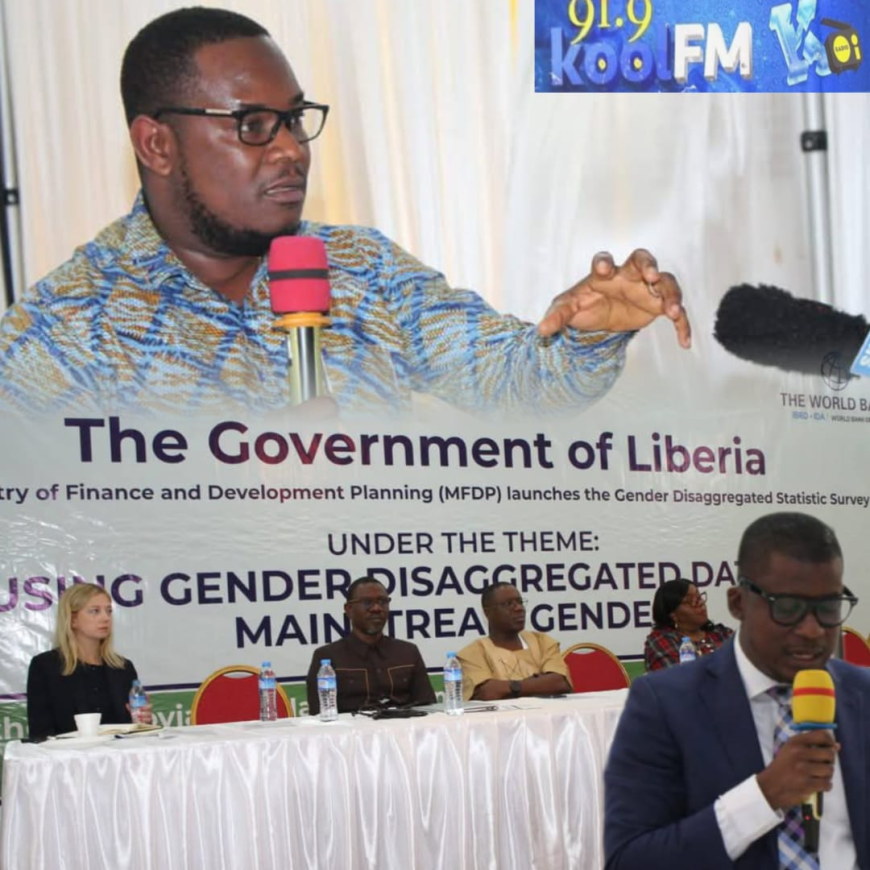GoL Unveils First-Ever Gender Report to Confront Gaps in National Policy Planning

Monrovia, Liberia: The Government of Liberia, in partnership with the World Bank, has officially launched the Gender Disaggregated Data Survey Report, a groundbreaking initiative aimed at addressing long-standing data gaps across Liberia’s critical sectors.
By: Abraham Sylvester Panto
The report provides a statistical foundation for analyzing disparities affecting women, men, girls, and boys, including people with disabilities, in areas such as education, health, and agriculture, sectors long hindered by policy decisions made in the absence of accurate, disaggregated data.
Delivering remarks on behalf of Finance and Development Planning Minister Augustine Kpehe Ngafuan, Deputy Minister for Administration Bill McGill Jones described the launch as the dawn of a new chapter in Liberia’s development narrative.
"This report signals the beginning of a new era of data-driven development,” Minister Jones stated. “With reliable gender-disaggregated data, we are now better positioned to formulate policies that reflect the lived realities of all Liberians.”
The report, developed with technical support from the Liberia Institute of Statistics and Geo-Information Services (LISGIS) and financed by the World Bank, seeks to bridge Liberia’s persistent data gaps and enhance public service delivery.
While the full report is pending public dissemination, summary insights presented at the launch suggest critical disparities:
Education: Girls in rural communities continue to drop out at higher rates, exacerbated by factors such as early marriage and inadequate sanitation facilities.
Health: Women face systemic barriers to maternal health care, while men exhibit low participation in preventive health services.
Agriculture: Although women form the backbone of the agricultural workforce, they own a fraction of available land and receive less institutional support.
These findings serve not only to quantify gender inequality but also to guide the formulation of targeted interventions.
Speaking on behalf of the Ministry of Gender, Children, and Social Protection, Deputy Minister for Research, Policy, and Planning Curtis Dorley emphasized the urgency of transforming statistical insights into policy outcomes.
"The timing of this report is critical,” he noted. “We must now leverage this data to advance gender equality and promote social inclusion through evidence-based programming.”
Other officials present included Deputy Minister for Budget and Development Planning Tanneh G. Brunson; Representative Johnson S. N. Williams, Sr., Chair on Gender Equality at the House of Representatives; and Deputy Minister for Planning and Development at the Ministry of Agriculture David K. Akoi.
Representing Liberia’s development partners, Madam Felecia Ubbesen, Political and Promotions Officer at the Embassy of Sweden, reaffirmed her country’s commitment to promoting gender equity.
She also underscored the importance of institutionalizing the use of data in policy formulation rather than relying on donor momentum.
Despite strong political messaging, Liberia’s bureaucratic landscape presents notable obstacles. Historical underinvestment in data infrastructure, fragmented inter-agency coordination, and capacity gaps pose challenges to sustained implementation.
What's Your Reaction?








































































